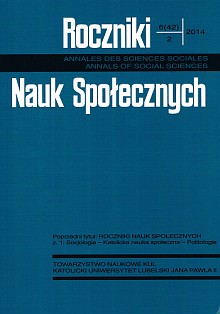Zaufanie do elit politycznych w Polsce. Dziedzictwo i teraźniejszość
Confidence in the political elite in Poland: Heritage and the present
Author(s): Konrad KubalaSubject(s): Social Sciences
Published by: Towarzystwo Naukowe KUL & Katolicki Uniwersytet Lubelski Jana Pawła II
Keywords: confidence; social capital; semi-periphery; meta-power of capital // zaufanie; kapitał społeczny; podmiotowość; pół-peryferia; meta-władza kapitału
Summary/Abstract: Artykuł poświęcony jest historycznym oraz egzogennym przyczynom niskiego zaufania do elit politycznych w Polsce. Autor stawia tezę, że do najważniejszych czynników warunkujących taki stan należą: a) przesunięty w czasie w stosunku do Europy Zachodniej proces indywidualizacji, z którego rodzi się tzw. kultura obywatelska; b) pół-peryferyjne położenie Polski na mapie systemów-światów skutkującego w przeszłości mizerią więzi społecznej typu Gesellschaft, zaś w teraźniejszości implikującego konieczność dostosowywania się do potrzeb globalnej gospodarki kapitału: c) stała tendencja obecna w świecie zachodnim, znajdująca wyraz w „wypisywaniu się ze wszelkiego rodzaju wspólnot politycznych wskutek postępowania procesów postpolityczności oraz mediatyzacji i skandalizacji polityki. Egzegeza powyższych elementów stanowiąca główną treść artykułu wsparta jest tezą o tym, że cyrkulacja władzy politycznej między głównymi aktorami scen narodowych, oraz incydentalnie pojawiającymi się podmiotami przerywającymi demokratyczny cykl konwergencji, nie ma kluczowego znaczenia dla poziomu zaufania społecznego deklarowanego wobec tych podmiotów. Autor stawia tezę, że żaden sposób prowadzenia polityki diametralnie i szybko ogólnego stosunku braku zaufania do elit politycznych nie przewartościuje // Article deals with the historical and exogenous causes of low confidence in the political elite in Poland. Author argues that the most important factors determining that state are: a) shifted in time relative to Western Europe, individualization process, which creates the so-called civic culture; b) semi-peripheral position of Poland on the world-systems map, resulting in a meager the Gesellschaft social bond in the past, and implying the necessity to adapt to the requirements of the global economy-capital, in the present; c) Western world‘s current trend which consist in unsubscribing from all kinds of political communities as a result of the processes of post-politics, mediatization and scandalization in politics. Exegesis of the above elements constituting the main content of the article is supported by the argument that the circulation of political power between the main actors of the national scenes, and occasionally emerging democratic parties intervening cycle of convergence, it is not crucial for public confidence towards these entities. Author argues that any kind of policy does not radically and rapidly reevaluate the general lack of confidence in the political elite.
Journal: Roczniki Nauk Społecznych
- Issue Year: 42/2014
- Issue No: 2
- Page Range: 033-046
- Page Count: 14

